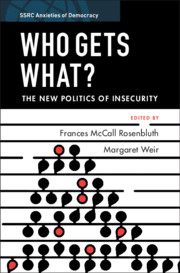Book contents
- Who Gets What?
- SSRC Anxieties of Democracy
- Sponsored by the Social Science Research Council
- Who Gets What?
- Copyright page
- Contents
- Figures
- Tables
- Author Biographies
- Acknowledgments
- 1 Introduction
- Part I People
- 2 Race, Remembrance, and Precarity
- 3 The End of Human Capital Solidarity?
- 4 Public Opinion and Reactions to Increasing Income Inequality
- 5 Engendering Democracy in an Age of Anxiety
- Part II Places
- Part III Politics
- Index
- References
3 - The End of Human Capital Solidarity?
from Part I - People
Published online by Cambridge University Press: 20 August 2021
- Who Gets What?
- SSRC Anxieties of Democracy
- Sponsored by the Social Science Research Council
- Who Gets What?
- Copyright page
- Contents
- Figures
- Tables
- Author Biographies
- Acknowledgments
- 1 Introduction
- Part I People
- 2 Race, Remembrance, and Precarity
- 3 The End of Human Capital Solidarity?
- 4 Public Opinion and Reactions to Increasing Income Inequality
- 5 Engendering Democracy in an Age of Anxiety
- Part II Places
- Part III Politics
- Index
- References
Summary
This chapter examines the connection between mass expansion of education and skills and growing discontent with established parties and the functioning of democracy. We argue that the expansion of higher education since the 1980s has not fulfilled the aims of the proponents of “social investment” strategies, as many university graduates enter jobs mismatched with their skills. Furthermore, inequalities have grown across individuals with similar skills working in similar industries as certain firms have captured the lion’s share of economic rents. Accordingly, rising inequality among the university educated and the accompanying unmet expectations of many graduates is producing important new cleavages, splitting young from old, urban from suburban, and the globally competitive from the traditional professional class. We refer to this as “the end of human capital solidarity” as highly skilled individuals diverge from one another in political preferences and satisfaction.
- Type
- Chapter
- Information
- Who Gets What?The New Politics of Insecurity, pp. 52 - 78Publisher: Cambridge University PressPrint publication year: 2021
References
- 4
- Cited by

